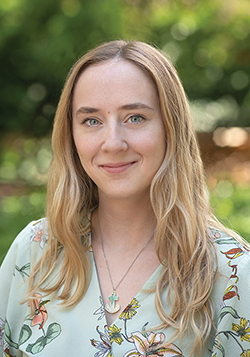
Pairing Solar Development With Innovative Land Management
With solar energy in Michigan poised to grow exponentially in the next decade, SEAS Assistant Research Scientist Brendan O’Neill says the time is right for solar developers to find innovative uses for their land that will optimize sustainability.
“Renewable energy is great, but it can count double if we manage it properly,” says O’Neill, who, for the past two summers, has been researching soil health and pollinator habitats at Cadillac Solar Gardens, a former brownfield site that was redeveloped through the collaborative efforts of the City of Cadillac, the State of Michigan and Consumers Energy, which owns the site.
“Right now, solar developers evaluate where they’re going to put sites based on their proximity to connecting to the power grid or the flatness of the topography,” O’Neill notes. “Really, though, solar development should be aligned so that it optimizes both energy and ecosystems—whether it’s biological diversity, the capacity to grow crops or the ability to improve water quality or sequester soil carbon.”

It’s a novel approach to land use and solar development, says O’Neill, who, in partnership with Consumers Energy, is using the solar gardens as a test site to study the soil ecological processes that lead to sustainable and regenerative land use. O’Neill is comparing three different plant communities—a standard turf grass mix and two diverse pollinator mixes—underneath and between the solar panels, and has been monitoring them over the past year to determine if pollinator-friendly plants can sequester carbon and regenerate degraded soil.
O’Neill’s research thus far has yielded two key findings. One is that plant biomass productivity of the pollinator mixes is double that of the grass mix. Plant biomass is the leading indicator of how much carbon you can sequester, “so the more biomass you have, the more carbon you can build in the soil,” O’Neill explains. Instead of regular mowing which releases CO2, the pollinator plant communities draw in atmospheric carbon and store it in soil.
“This reflects the fact that if you are a bit more innovative with what you plant, you not only have more aesthetic beauty with pollinators, but you can also build carbon much more rapidly.”
Another important finding relates to the effects of growing plants in shaded areas versus non-shaded areas. While it may appear that plants underneath solar panels might not grow as well as plants that are in the open “alleyways” between the panels, O’Neill says he “hasn’t found a strong difference” in plant productivity between the two areas.

In fact, the cooler, wetter microclimate underneath solar panels actually benefits certain types of plants, O’Neill adds, which means there is the potential for solar sites to favor a variety of diverse plant species that can enhance ecosystem services on the solar site.
“What this research really highlights is that if you develop solar creatively, you can really ensure that this large land-use transformation is built for sustainability,” notes O’Neill. “And it provides a toolbox to develop solar in a way that’s compatible with different land uses, from agriculture to conservation.”
Over the next year, O’Neill will continue to measure how pollinator mixes build soil health and quantify changes in soil carbon on the solar site. Ultimately, he wants to use the data to develop a model for how to optimize ecosystem services on other solar sites across Michigan, which SEAS second-year master’s student Haley Dalian fully supports.
“It is no longer enough to install solar panels without considering the soil, vegetation and organisms residing beneath them,” says Dalian, who assisted O’Neill’s research efforts last summer while interning for Consumers Energy. “Dr. O’Neill’s experiments on soil health and pollinator habitat at the Cadillac site are critical to informing utility-scale solar land management going forward for mutual benefit.”

